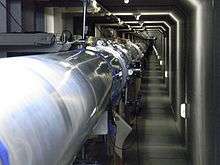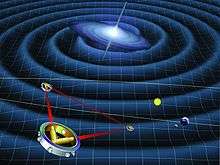TAMA 300
 | |
| Coordinates | 35°40′36″N 139°32′10″E / 35.67661°N 139.53617°ECoordinates: 35°40′36″N 139°32′10″E / 35.67661°N 139.53617°E |
|---|---|
| Website |
tamago |
TAMA 300 was a gravitational wave detector located at the Mitaka campus of the National Astronomical Observatory of Japan.[1] It is a project of the gravitational wave studies group at the Institute for Cosmic Ray Research (ICRR) of the University of Tokyo. The ICRR was established in 1976 for cosmic ray studies, and is currently developing the Kamioka Gravitational Wave Detector (KAGRA).
Construction of the TAMA project started in 1995. Data were collected from 1999 to 2004. It adopted a Fabry Perot Michelson Interferometer (FPMI) with power recycling. It is officially known as the 300m Laser Interferometer Gravitational Wave Antenna.
The goal of the project was to develop advanced techniques needed for a future kilometer sized interferometer and to detect gravitational waves that may occur by chance within the Local Group.
TAMA has been decommissioned, and work moved to the 100 m Cryogenic Laser Interferometer Observatory (CLIO) prototype in Kamioka mine.
See also
- CLIO, a prototype interferometric gravitational wave detector operating in Japan.
- KAGRA, a state-of-the-art interferometric gravitational wave detector under development in Japan
References
| Wikimedia Commons has media related to TAMA 300. |

